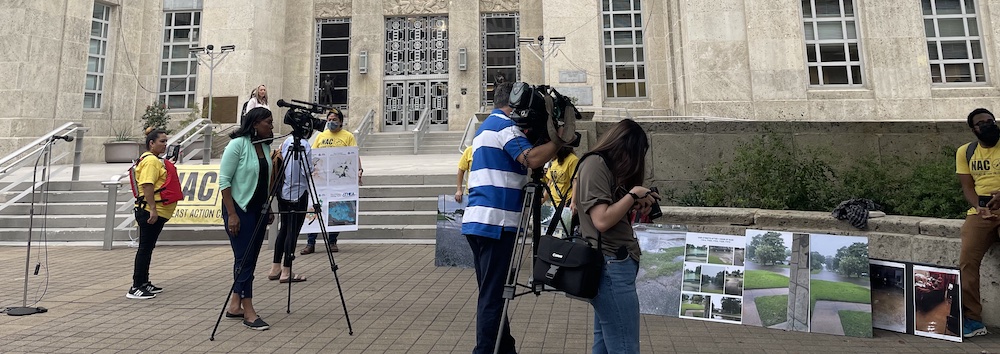 Northeast Action Collective in Houston, Texas organizes around issues of inadequate drainage in northeast Houston; here, the group gathers at City Hall to advocate for better flood infrastructure. ©Melissa Villarreal
Northeast Action Collective in Houston, Texas organizes around issues of inadequate drainage in northeast Houston; here, the group gathers at City Hall to advocate for better flood infrastructure. ©Melissa Villarreal
Houston has not yet fully recovered from Hurricane Harvey, which made landfall in August 2017. Mexican immigrant households have struggled to move forward in the years since the disaster unfolded, especially amid several subsequent flooding events and tropical storms, a devastating winter storm, and the still ongoing COVID-19 pandemic.
 Natural Hazards Center Graduate Research Assistant Melissa Villarreal is currently conducting research on housing recovery for Mexican immigrant women in Houston, Texas. © Melissa Villarreal
Natural Hazards Center Graduate Research Assistant Melissa Villarreal is currently conducting research on housing recovery for Mexican immigrant women in Houston, Texas. © Melissa Villarreal
Natural Hazards Center graduate research assistant, Melissa Villarreal, started conducting research on the recovery of Mexican immigrants in Houston in 2019, speaking to service providers from community-based organizations, such as the Northeast Action Collective and the broader organization it emerged from, West Street Recovery.
“It was an honor to receive the support from organizations such as West Street Recovery in this work,” Villarreal, who is a native of Houston, said. “The Mexican immigrant community has faced numerous challenges in their recovery, and it is important to work together to shed light on the root causes of those challenges in order to properly address them.”
Villarreal received the National Science Foundation Graduate Research Fellowship in 2019, which gave her funding for three years to conduct this timely research. In 2021, she was awarded $14,157 through the prestigious American Sociological Association’s Doctoral Dissertation Research Improvement Grant (DDRIG).
This additional financial support allowed her to continue this research in fall 2021 and spring 2022. Specifically, the DDRIG provided Villarreal with funding for relocation costs from Boulder, CO to Houston, TX; participant and recruitment compensation; living costs; and funds to hire a Latina undergraduate research assistant.
“When I moved back to Houston to continue this research, I conducted follow-up interviews with some of the service providers I talked to in 2019 to understand the progression of recovery in the context of cumulative disaster impacts and with a focus on gender stratification,” explained Villarreal. “Importantly, I also conducted interviews with 56 Mexican immigrant women to gain their perspectives on long-term recovery from Harvey. Most of these women described how they had not yet recovered.” Villarreal noted that during the interviews, many of the women would talk about their ongoing mental health struggles or they would walk her to parts of the house to show her rooms still closed off and unrepaired since the hurricane.
With the help of an undergraduate research assistant, Villarreal is currently working on analyzing all interviews with service providers and Mexican immigrant women as well as U.S. federal, state, and local disaster recovery policy documents. This project is Villarreal’s dissertation, which she plans to complete and defend in spring 2024.
Villarreal has previously been recognized for her work on women’s experiences in disasters. Her plan is to continue conducting research on marginalized communities after she graduates. “My hope is that my research is utilized to produce social and political change to improve the lived realities of vulnerable populations during disasters.”


This material is based upon work supported by the National Science Foundation Graduate Research Fellowship Program under Grant No. (NSF #DGE 1650115). This research has also been supported by the American Sociological Association Doctoral Dissertation Research Improvement Grant (ASA DDRIG) and CU Boulder’s Center to Advance Research and Teaching in the Social Sciences (CARTSS) Graduate Student Award, Beverly Sears Graduate Student Grant, and Sociology’s Racial/Ethnic Inequality Research Award and Betsy Moen Walk the Talk Award.